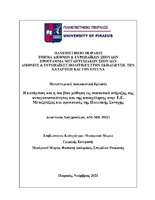Η κατάρτιση και η δια βίου μάθηση ως συστατικά στήριξης της ανταγωνιστικότητας και της απασχόλησης στην Ε.Ε. Μετεξελίξεις και προοπτικές της πολιτικής συνοχής

View/
Keywords
Δια βίου μάθηση ; Κατάρτιση ; Απασχόληση ; Πολιτική συνοχήςAbstract
For the European Union, in recent decades, training and lifelong learning have been the main means of supporting employment and, therefore, placing them at the core of its priorities. Cohesion Policy invests in human capital to support employment and competitiveness, to reduce social inequalities and to achieve social cohesion between Member States, regions and individuals. The strict criteria of Economic and Monetary Union in combination with the advent of the international financial crisis in 2008 and the subsequent socio-economic crisis caused by the Covid-19 pandemic contributed to the changes in Cohesion Policy. The global economy and the rapid digital transformation require by the productive population to have a wide range of knowledge and skills in order to access and integrate into the labor market. This paper attempts to investigate the impact of training and lifelong learning on EU employment and competitiveness, as well as exploring the future impact of recent changes to Cohesion Policy.
The results of the survey show that training and lifelong learning have a positive effect on supporting EU employment and competitiveness. However, the neoliberal orientation of the EU social agenda has a different view on the subject. Although the main goal of the EU is the increase of employment, takes into account structural unemployment shifting the responsibility to the individuals for their employability while at the same time creating a new employment regime. The intensification of control and monitoring of national action plans to harmonize national training and lifelong learning policies brought about by recent changes in Cohesion Policy has resulted in the growing influence of the supranational over national policy, without, however, modifying relations between the Member States and the European Commission.


